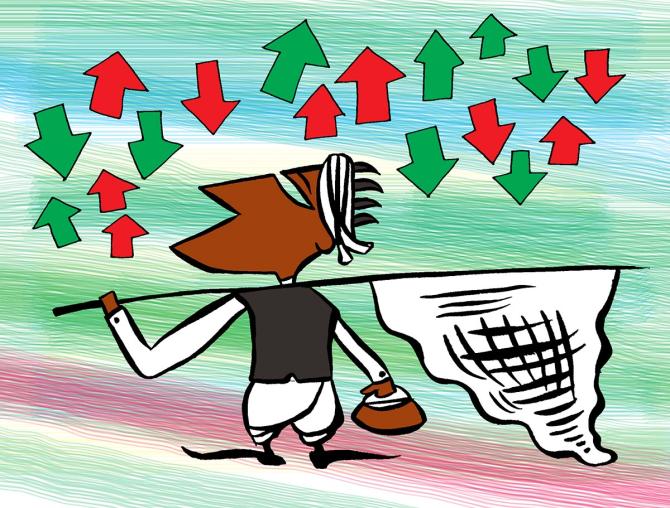'If one believes that the Indian stock market will go up 70 per cent every year for the next 10 years, I wish you good luck!'

Most equity markets across the globe have been on a roller-coaster ride over the past few months, impacted by the rampant spread of Covid and surging bond yields.
The story back home has been no different. Marc Faber, editor and publisher of The Gloom, Boom & Doom Report, tells Puneet Wadhwa that he does not have Indian stocks in his portfolio, and may look to buy once the Sensex is in the 40,000-45,000 region.
The global economy seems to be recovering well after the dip in 2020. Are we out of the woods?
It depends on what you mean by 'recovering well'.
If you talk about the stock markets, then yes. Stock markets, property markets, and cryptocurrencies have been going up.
On the other hand, when you look at employment, that is the number of people that work as a percentage of the population, then the economy, I would say, is not doing well.
The global economy is well below the levels seen in 2019.
There are a number of people who have lost their jobs. In the US, there are a number of people who do not want to work as they get benefits from the government.
They get more as subsidy than going to work. So, while the stock markets appear strong, the economy is not.
Within the economy, there are some sectors that are strong and the others will become so in the future.
For instance, in a country like Thailand, tourism is down 90 per cent from peak levels.
Whenever the country opens up and they let people in -- with or without vaccines -- the tourism sector will pick up.
In the US, consumption is slow. Most of the goods are imported; as a result, the trade deficit is at record levels.
Even the stock market recovery has been polarised across regions. Will this continue?
Yes, the stock markets in Europe are still much lower than in 2018-2019.
In Asia, many markets are still lower than the levels seen two years ago. This will continue.
What are your views on the Indian economy against the backdrop of rising Covid cases? Can there be a slow grind back into recession?
That depends on what people think about Covid.
I believe it is something like flu -- a severe flu.
Once the entire world has this flu, there will be herd immunity.
India, Vietnam, and Thailand had comparatively few cases when the first wave struck last year.
We have a large number of cases in the US. If we compare the damage caused by the other illnesses, the death rate in the case of Covid is still low.
The Indian economy, I feel, should grow at 4-5 per cent in real terms in 2021.
That said, it is difficult to predict the possibility of a recession right now for Indian economy.
Spurred by liquidity, do you think global equity markets are in a bubble zone -- or are nearing one?
We need to qualify this. In India, there are some stocks that appear overvalued and are in a bubble zone.
The expectations are very high from a lot of companies and their stocks to deliver.
In the US, for instance, oil, finance, and banks are some of the sectors that are still not terribly expensive.
Then there is a lot of speculation in cryptocurrencies.
So, there are bubbles across markets in certain pockets, but one cannot generalise.
Precious metals are not in a bubble yet. Speculation has now shifted to cryptocurrencies and new issues (initial public offers), and futures and options trades.
What has been your investment strategy in the past one year?
I hold a diversified portfolio of real estate, stocks, bonds, commodities, precious metals, and some cryptocurrencies.
In essence, I am adequately diversified. The most unattractive assets currently are bonds.
However, in the US, we have had a strong recovery because of the stimulus and some spending.
All this will fizzle out. So at the end, I believe the US bond/treasury market will rebound.
Over the long term, interest rates across the world will rise.
From their peak levels last seen in 1981, interest rates have been slipping until 2020. We are in a rising cycle of interest rates now.
The European markets have not done well this year, but some emerging markets have.
We invested in Uzbekistan, which is up almost 30 per cent this year.
Iraq is up almost 20 per cent.
Vietnam, too, has been strong and has gained 14 per cent this year.
Growth versus value stocks -- which side are you leaning towards now?
In the past five years, growth stocks have outperformed value stocks.
And I think we are now coming to a stage where value stocks will outperform growth stocks.
That said, in India, some stocks are still not very expensive.
Among the lot, I find bank stocks to be very expensive in India.
Where do you place equities as an asset class in terms of your preference?
I like Asian markets. The stock markets in Hong Kong and Singapore are fairly cheap.
One can easily make a portfolio in these two markets that gives a dividend yield of around 4 per cent, which is a high return compared to money in the bank.
But the frontline indices in India returned in high double-digits in the last financial year. That still does not interest you?
Yes, I agree that the returns were phenomenal. If one believes that the Indian stock market will go up 70 per cent every year for the next 10 years, I wish you good luck!
Of all the Asian markets, the Indian equities are the most expensive.
Currently, I have no position in the Indian stock market.
I may look at Indian stocks on a correction -- perhaps once the Sensex is in the 40,000-45,000 zone.
Returns from the Indian stock market in the next one year will be disappointing.
How long do you see global central banks remain in accommodative mode?
The question is when they will stop printing money! I don't think they will.
They can perhaps slow the rate of accommodation, but cannot stop now.
It has been my observation that once begun, these policies of monetary and fiscal intervention are difficult to stop and cause a lot of pain in the economy once they are halted.
As regards India, the fiscal deficit is likely to stay high.
The Reserve Bank of India will remain accommodative, but not as much as the European Central Bank and US Federal Reserve.
The main advantage with the US is that they can print as much as they want without having much impact on the US dollar.
But in India if the RBI prints too much, it will impact the rupee.











